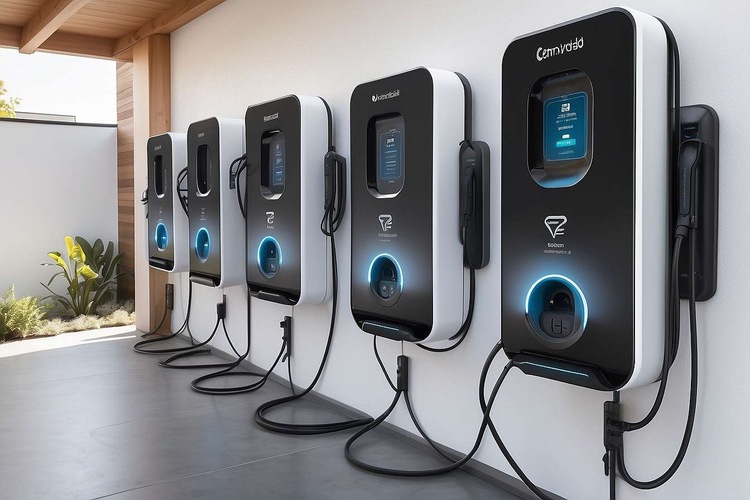Understanding Home EV Charge Point Installation Costs and Options
Electric vehicle adoption continues to rise across the UK, making home charging solutions increasingly important for EV owners. Installing a charge point at home provides convenience and can reduce overall charging costs compared to public charging networks. However, many factors affect the installation process, costs, and options available. This comprehensive guide explores everything you need to know about home charging solutions, from initial costs to installation requirements and available government incentives.

Factors Affecting Home Charging Point Installation Costs
The cost of installing an EV charger at your home varies significantly based on several key factors. The property type plays a crucial role - detached houses with driveways typically require simpler installations than flats or properties without dedicated parking. The distance between your fuseboard and the desired charger location directly impacts installation complexity and costs, with longer cable runs requiring more materials and labor. Additionally, your home’s electrical capacity may need assessment, as older properties might require electrical upgrades to handle the additional load safely. Surface mounting on external walls is generally less expensive than installations requiring extensive groundwork or wall penetrations, which can add several hundred pounds to the final cost.
Different Types of Home Car Chargers and Pricing
Home EV chargers come in various types with different capabilities and price points. The most basic distinction is between 3.6kW, 7kW, and 22kW units. While 3.6kW chargers are the most affordable (typically £500-£800 including standard installation), they provide slower charging times. The popular 7kW units strike a balance between cost (£800-£1,200) and charging speed, capable of fully charging most EVs overnight. High-powered 22kW chargers cost significantly more (£1,200-£2,000+) and require three-phase power, which most UK homes don’t have without expensive electrical upgrades. Smart chargers, which offer app control, scheduling capabilities, and energy monitoring, typically cost £100-£300 more than standard units but can help optimize charging during off-peak electricity hours, potentially saving money long-term.
Electrical Work Requirements and Additional Costs
The electrical infrastructure of your home can significantly impact both installation complexity and costs. Most EV chargers require a dedicated circuit from your consumer unit (fuseboard), and older fuseboards may need upgrading to accommodate this additional load. Consumer unit replacements can add £400-£600 to installation costs. Properties with limited electrical capacity might require capacity assessments and potentially upgraded incoming supply, which involves your electricity network provider and can add £1,000+ to costs. Groundworks for cable routing across driveways or gardens typically cost £50-£100 per meter. Additionally, some installations require earth rod installation (£150-£250) if the property has TT-type earthing rather than the standard PME earthing system found in most UK homes.
Government Incentives for Home Charging Installations
While the UK government’s Electric Vehicle Homecharge Scheme (EVHS) for private homeowners ended in 2022, there remain several support options for certain groups. The EV Chargepoint Grant provides up to £350 toward installation costs for people living in flats or rental accommodation. For businesses, the Workplace Charging Scheme offers vouchers covering up to 75% of installation costs (maximum £350 per socket) for up to 40 charging sockets. Additionally, reduced 5% VAT applies to home charger installations rather than the standard 20% rate, providing modest but helpful savings. In Scotland, interest-free loans are available through the Energy Saving Trust for EV charger installations, while some local authorities offer their own incentive programs worth investigating.
Choosing Qualified Installers for Car Charging Points
Selecting the right installer is crucial for safety and reliability. Always ensure installers are OZEV-approved (Office for Zero Emission Vehicles) and registered with recognized certification bodies like NICEIC or NAPIT, which verify electrical competence. Reputable installers should conduct pre-installation surveys to identify potential issues before work begins. Compare multiple quotes to ensure competitive pricing, but be wary of quotes significantly below average as these may indicate corners being cut. Check installer reviews and ask for references from previous customers. Quality installers typically offer comprehensive warranties covering both parts and labor for at least three years, with manufacturer warranties on the charging equipment often extending to 5-7 years.
The table below provides an overview of typical home EV charger options and their approximate costs:
| Charger Type | Power Output | Average Cost (incl. standard installation) | Typical Features |
|---|---|---|---|
| Basic Non-Smart | 3.6kW | £500-£800 | Simple plug-in charging, no connectivity |
| Standard Smart | 7kW | £800-£1,200 | App control, scheduling, energy monitoring |
| Premium Smart | 7kW | £1,000-£1,400 | Solar integration, load balancing, advanced features |
| High-Power | 22kW | £1,400-£2,500+ | Requires three-phase power, fastest home charging |
| Portable EVSE | 2.3-3.6kW | £200-£400 | No installation, plugs into standard socket, slower charging |
Prices, rates, or cost estimates mentioned in this article are based on the latest available information but may change over time. Independent research is advised before making financial decisions.
Installing a home charging point represents a significant investment for EV owners, but the convenience and potential long-term savings make it worthwhile for most. By understanding the factors that influence costs, exploring available incentives, and selecting qualified installers, you can make informed decisions about the most suitable charging solution for your needs. Remember that while upfront costs may seem substantial, home charging typically offers significant savings compared to relying solely on public charging networks over the lifetime of your electric vehicle.




